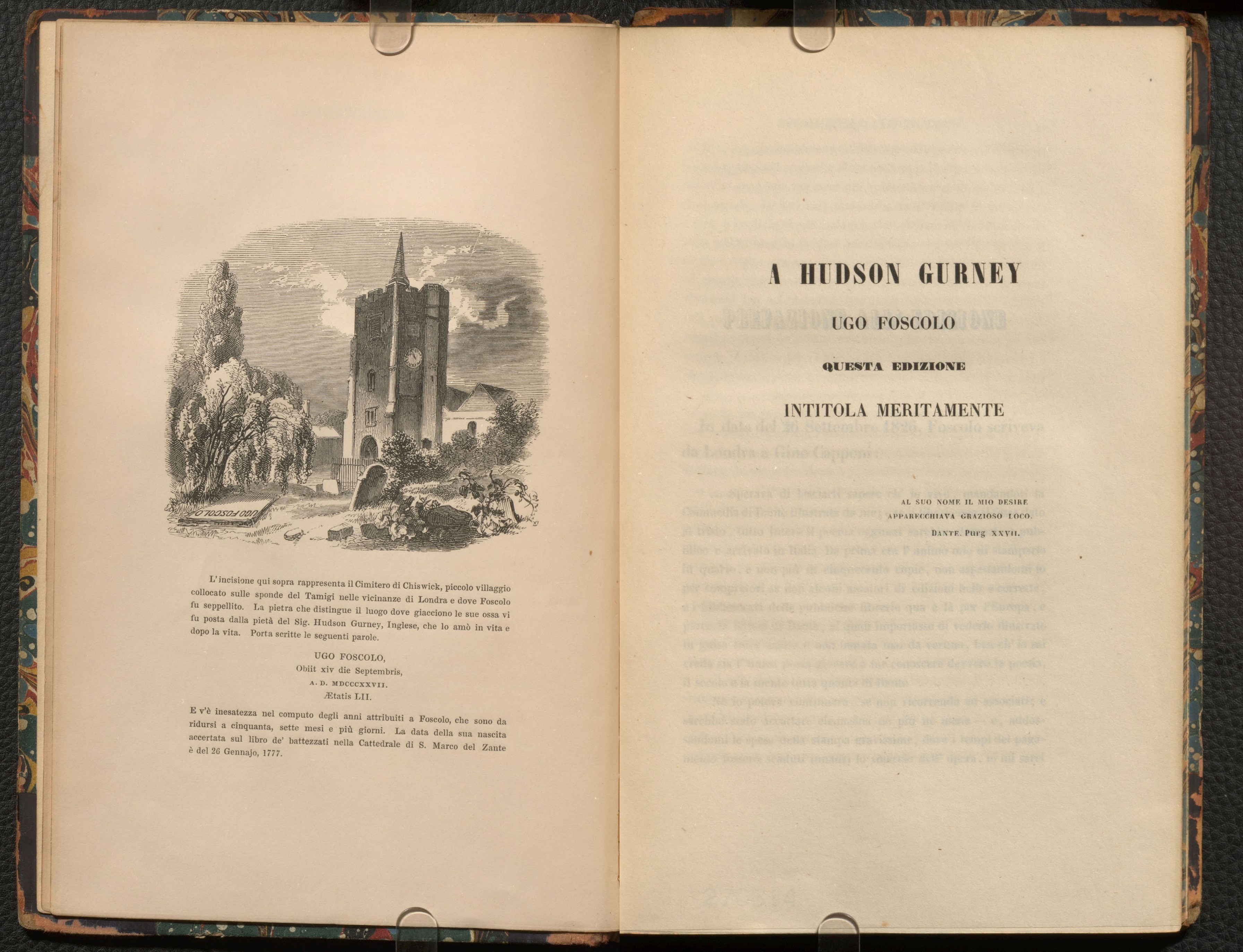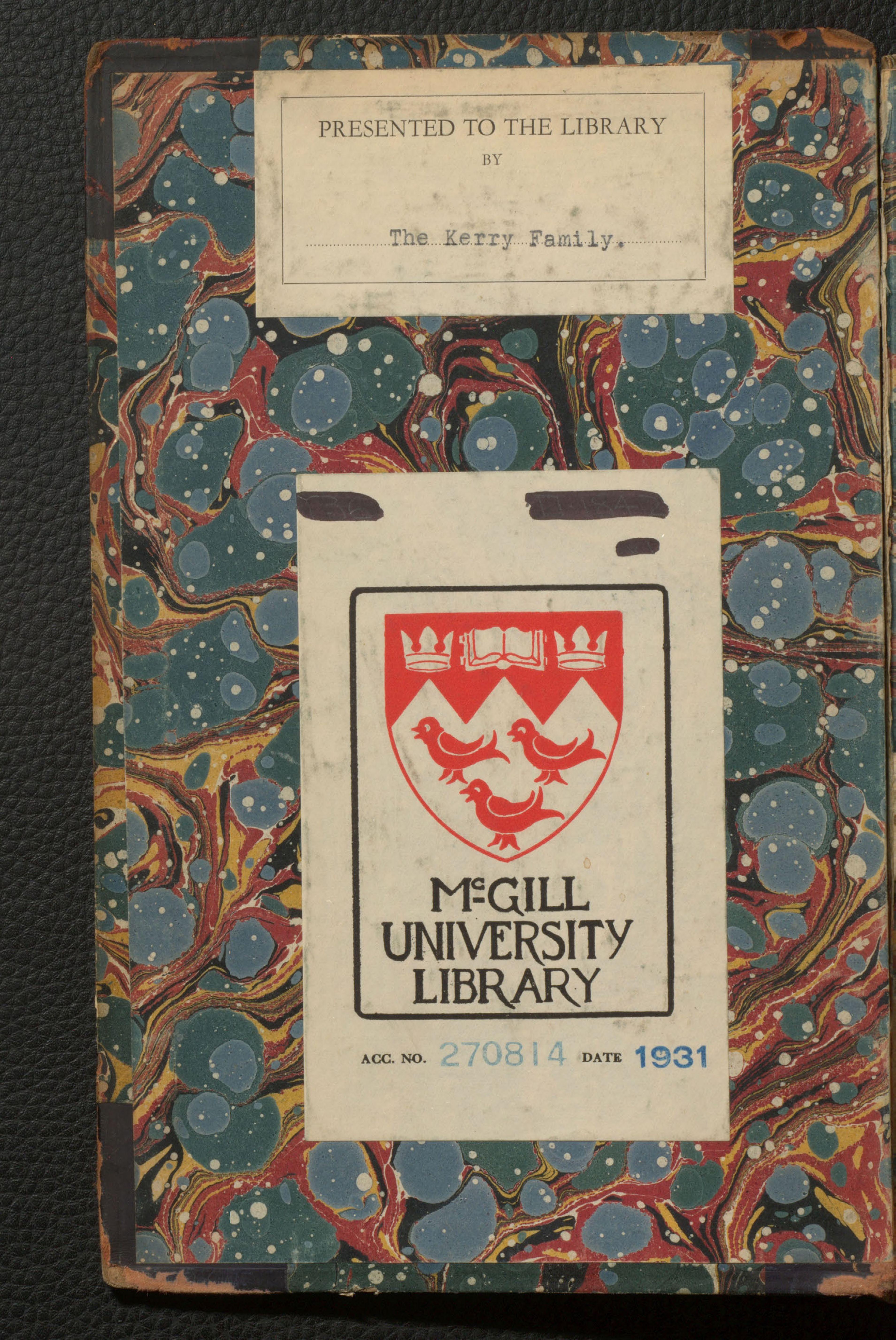Pietro Rolandi published this four-volume edition of Dante’s Comedy in Italian edited by Giuseppe Mazzini and Ugo Foscolo and illustrated by the latter. The first tome is composed of Foscolo’s Discorso, a critical discourse on Dante’s work, as well as prefaces from both editors. It is dedicated to Hudson Gurney, a renowned English antiquarian and bibliophile and member of the parliament. The other volumes contain Dante’s Comedy as well as various notes and correspondences that were added by Mazzini to complete the text.

Foscolo was a Venetian poet, exiled in 1814 for his political positions, being in favor of the unification of Italy, he moved to London where he became famous among Italian expatriates for his patriotism. He supported himself by teaching and writing commentaries on Dante -- a poet for whom he always expressed a deep interest. Foscolo's love for Alighieri was borne from a sense of empathy for the Florentine poet who, like him, had suffered the pain of exile and was sentenced to die far from his homeland. The theme of exile is central to Foscolo's lyrical expression as he himself shows us in the poem A Zacinto. Foscolo embodies the nineteenth-century ideal of the poet, fatally inclined to heroism and transgression, similarly to his literary character, Jacopo Ortis. Only in this sense does he really belong to the cultural climate of European romanticism (Enciclopedia Dantesca 1970). Foscolo is a precursor of contemporary criticism of Dante's works. Before his time, he had taken note of the static nature of Dante's criticism by arguing that Dante should be explained in the light of the culture, passions and events of his time. This position is reflected by the exegesis he wrote. Foscolo regarded the Comedy as a medieval text, which must be read and interpreted as such and which would only remain partly impenetrable to a reader of another era. His criticism was directed towards Italian critics for refusing to reflect on the medieval context of Dante’s work, mainly because the Middle Ages were tied to the censorship of the Church. Foscolo wished to make Dante’s work available to present and future readers, without the ecclesiastical propaganda. Foscolo had published numerous essays on Dante's criticism leading up up to the first publication of his critical reading of Dante’s text in 1825 contained in this edition (Cornell University, 1898-1900). His illustrations aimed to capture Dante's imagination for present and future Italians.
Giuseppe Mazzini, militant of the Carbonari (1827-30), was exiled to France and Switzerland, where he developed the Young Italy project (La Giovane Italia), a political movement which adhered to the republican principle of a united nation, made up of free and equal citizens (Finelli 2004). He went to England (1837) where he lived for some years in solitude, with limited economic resources but developing his political thought and his literary culture (Dizionario Biografico degli Italiani 2008). Exiled in 1831, he became an influential figure among other Italian intellectuals expatriated to London. Animated by profound republican and democratic convictions, he was one of many intellectuals at the heart of the Italian Risorgimento who contributed to the struggle for Italian independence, as well as for the unification of Italy into a single state (Mastellone 2000). One endeavour which cost him much effort and brought him no material gain, but represented the fulfillment of a moral commitment dear to him, was the edition of the manuscript of a comment by Foscolo on the Comedy. However, the manuscript (found at an English bookseller’s), of which he was an estimator, was incomplete; so much so that Mazzini had to combine it with an annotation to which he also added a revision of the text and an unsigned introduction (Dizionario Biografico degli Italiani 2008).
Pietro Rolandi (1801-1863) was born in Piedmont. After having studied literature, art and design in Florence and Rome in the summer of 1821, he moved to London to assist his older brother in the printing and publishing of classic Italian literature (Del Cornò 2015). Pietro Rolandi was well received by his brother's acquaintances, made up on the one hand of Italian exiles and emigrants who were trying to rebuild a new life in liberal London, and on the other hand of English intellectuals, fascinated by the culture and political events of the peninsula (Dizionario Biografico degli Italiani 2017). This edition of the Comedy is the result of his associations within these environments frequented by Foscolo and Mazzini (Del Cornò 2015).
Full title: La Commedia di Dante Alighieri illustrata da Ugo Foscolo.
Author: Dante Alighieri (1265-1321); Ugo Foscolo (1778-1827, editor), Giuseppe Mazzini (1805-1872, editor).
Date of publication: 1842.
Place of publication: London, U-K.
Editor: Pietro Rolandi.
Content: Preliminaries: Prefazione all’edizione (pp. 5-20); Al lettore (pp. 21-30); Discorso sul testo di Dante (pp. 1-447); Nota alla pag. 79 (pp. 448-453); Prospetto del discorso (pp. 455-467).
Language: Italian.
Physical description: in 4 vol., vol 1: 467 p., 23 cm. Marbled paper on cardboard. The frontispiece consists of a printed engraving of Ugo Foscolo by H. Robinson Sculp. Below the illustration, a note on the publication indicates: “Pub. In Londra da P. Rolandi. 20. Berners Street, 1844. L’originale trovasi presso il Sig’Murray”.
A second frontispiece can be found just before the preface. On the left is an illustration depicting the resting place of Ugo Foscolo with Italian text relating to the image below. On the right lies a dedication to Hudson Gurney who is said to have cared for Ugo Foscolo in “life and after life”.
Inside: The text is in Italian and centered on the page. The preface consists of a presentation by Mazzini and a section addressed to the reader by Foscolo. The “Discorso” is followed by notes.
The text is illustrated with nine engraved plates, including the portraits of Foscolo and Dante, and the maps of Hell, Purgatory and Paradise.
Call number: McGill Rare Books and Special Collections, OCTAVO-8674.
Catalogue: https://mcgill.on.worldcat.org/oclc/8391507
Digitisation: https://archive.org/details/McGillLibrary-rbsc_commedia-di-dante-allighieri_OCTAVO-8674_v1-20471/page/n17/mode/2up

Previous owners: Kerry Family.
Ex-libris and stamps: On the front pastedown can be found an adhesive label in the center of the upper margin with a note composed partly in printed letters and partly in manuscript writing, which reads: “Presented by the library of The Kerry Family”. Again, on the front pastedown can be found an adhesive label in the center with the McGill coat of arms and decorative name “McGill University Library”. Below lies the printed information “Acc. No. 270814, Date 1931”
History of the copy: The book was donated by the Kerry Family, descendants of John Kerry who was born in 1825 in London and became a prominent figure in the pharmaceutical business as well as in the élite society of Montreal.
Notes: On page 31 of the text a printed facsimile of Foscolo's handwriting, the engravings, including two portraits, one of Dante and one of Foscolo, views of the church of Ravenna containing the tomb of Dante and Foscolo's grave at Chiswick, plans of Hell, Purgatory and Paradise, and a facsimile of Foscolo's sonnet on his own portrait are wanting in this copy.
The other volumes of the edition contain:
T. 2. Inferno; Appendice: Epistola di Dante ad Arrigo di Luxemburg ... volgarizzamento dal latino d'autore antico e di data incerta; Epistola di Dante a principi e cardinali dopo la morte di Clemente V. affinchè eleggessero papa italiano, volgarizzamento dal latino d'autore antico e di data incertissima; Inferni, capitulum IV-VII (translation in Latin hexameters ed. from the Fontanini codex).
T. 3. Purgatorio. Canzoni 1-2. Epistola dedicatoria della cantica del Paradiso: Magnifico atque victorioso d. d. Kani Grandi de Scala. Paradiso. Canzone 3.
T. 4. Cronologia di avvenimenti connessi alla vita, e alla Commedia di Dante, avverata su gli annali d'Italia, e documentata con citazioni dalle opere del poeta. Notizie e pareri diversi intorno a forse duecento codici e alla serie delle edizioni della Commedia di Dante. Indice de' vocaboli, nomi, avvenimenti storici e allusioni riferiti con dichiarazioni a' versi del testo.
Bibliography
Enciclopedia Dantesca. 1970. S.v. “Foscolo, Ugo”, di Mario Scotti. https://www.treccani.it/enciclopedia/ugo-foscolo_%28Enciclopedia-Dantesca%29/ (consultato il 21/05/2021).
Dizionario Biografico degli Italiani. 2008. S.v. “Mazzini, Giuseppe”, di Giuseppe Monsagrati. https://www.treccani.it/enciclopedia/giuseppe-mazzini_%28Dizionario-Biografico%29/ (consultato il 21/05/2021).
Dizionario Biografico degli Italiani. 2017. S.v. “Rolandi, Pietro”, di Federica Rossi. https://www.treccani.it/enciclopedia/pietro-rolandi_ (Dizionario-Biografico) (consultato il 21/05/2021).
Finelli, Marco. 2004. Il monumento di carta. L’Edizione nazionale degli scritti di Giuseppe Mazzini. Villa Verucchio: Pazzini.
Del Cornò, Andrea. 2016. Letture e libri italiani nella Londra vittoriana: la bottega libraria dei fratelli Rolandi di Quarona. Torrita di Siena: Società Bibliografica Toscana.
Mastellone, Salvo. 2000. La democrazia etica di Mazzini (1837-1847). Rome: Archivio Guido Izzi.
Author and date of the record: Matteo Ottaviani, 21/05/2021.